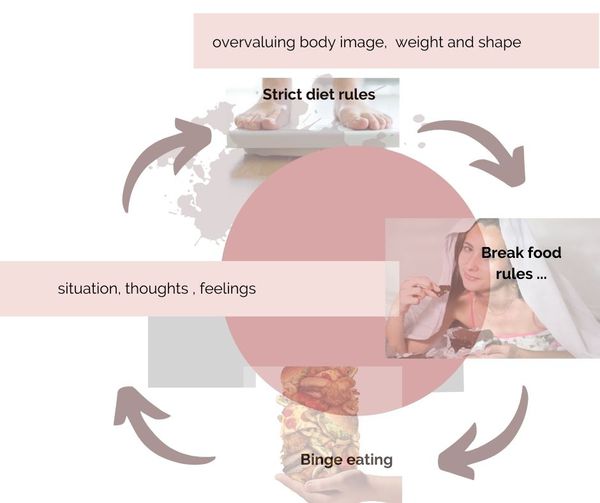Binge Eating Disorder

Binge Eating Disorder: symptoms , causes and treatment
It is normal to overeat and undereat sometimes. Eating patterns become a problem when they become our primary way of coping with uncomfortable thoughts and feelings, either through overeating, undereating or both.
You would likely be suffering from a Binge Eating Disorder if you are experiencing the following:
- Eating a large amount of food, often in a short space of time, relatively quickly
- Eating continuously following on from meals
- Constantly picking at food throughout the day without necessarily being conscious of it
- Waking up in the night and eating large amounts of food
- Habitually eating larger portion sizes even when not physically hungry
- Engaging in repeated dieting while experiencing increasing difficulty controlling eating patterns
- Eating secretly due to embarrassment of the amount being eaten
- Experiencing guilt, shame, disgust or/and depressed at the amount of food eaten
Ultimately, people can feel painfully full and will view their eating patterns as out of control. This results in overwhelming feelings of guilt and shame which then facilitates the secrecy attached to binge eating behaviours.
What are the causes of binge eating disorder?
All Behaviours serve a function and it is therefore helpful to contextualise these behaviours using a biopsychosocial perspective. Here are some factors which influence and contribute to the development of binge eating disorder:

Biological foundations:
Genetic research suggests that some people might have a predisposition to developing binge eating symptoms due to brain structure, hormonal irregularities and genetic figurations. These biological nuances are related to appetite and satiety which may relate to compulsive eating. In addition, research has indicated that binge-eating behaviours are more likely to occur in those individuals genetically predisposed to a higher weight status.
Animal studies have identified factors such as stress, food deprivation, restriction, environmental triggers and associations, all contribute to the development and maintenance of binge eating disorder.
Psychological Factors:
Studies indicate a significant correlation between depression and binge eating. The inability to stop or control how much food is consumed is linked to high emotional distress which, in turn, contribute to feelings of depression.
Additional psychological influences are low self esteem, body dissatisfaction, and difficulties in self-regulating emotions. As a result of body dissatisfaction, many people who struggle with binge eating disorder, have a history of repeated dieting. Research studies have established that food deprivation and severe restriction can trigger urges to binge eat.


Social and Environmental Influences:
Emotional needs may not necessarily have been nurtured within families of origin. The expression of emotion might not necessarily have been encouraged particularly within more controlling or volatile environments, thereby contributing to the development of alternative strategies for coping with emotions.
For some, blocking out or shutting down feelings will have been a survival strategy in order to preserve day to day functioning. In addition, experiences associated with trauma may also increase the risk of binge eating, Finally, exposure to social media influences and pressures to be thin can trigger emotional eating responses.
The Binge Eating Maintenance Cycle
What are the long term consequences of binge eating disorder?
Some individuals might experience health concerns due to body weight as well as the physiological impact of binge eating on their body and lifestyle. Binge eating can contribute to low self esteem, maintaining a preoccupation with food, eating and weight. A perceived inability to change might lead to feelings of guilt, shame, depression and anxiety. Individuals might as a result, become more withdrawn and socially isolate.
These physiological, emotional and relational factors all serve to reinforce the negative cycle of binge eating behaviours, in the absence of alternative and effective strategies.

What is the treatment for binge eating disorder?
Binge eating disorder is an eating disorder about behaviour, not body size. Historically, binge eating has been ‘treated’ with weight loss, restriction, or dieting, which is harmful and typically triggered the bingeing behaviour to begin with.
One of the main features of binge eating disorder are feelings of loss of control. In order to re-assert some semblance of control, some people would experiment with regular unsuccessful attempts at dieting. This would often be accompanied by feelings of hopelessness.
One of the main features of binge eating disorder are feelings of loss of control. In order to re-assert some semblance of control, some people would experiment with regular unsuccessful attempts at dieting. This wouldTreatment for binge eating disorder involves exploring the underlying emotional symptoms as well as addressing the cognitive and behavioural processes related to eating patterns and may take the following forms: often be accompanied by feelings of hopelessness.
Nutritional and dietetic counselling : addresses binge eating behaviours
A registered dietitian would engage in interventions based on a nutritional assessment, and these might include monitoring and evaluation of meal plans, psychoeducation about food, physiology and weight. Individuals would be learning skills around self-monitoring, challenging false beliefs and identifying triggers to binge eating. The aim of nutritional counselling in the first instance, would be to control and reduce binge eating episodes. The focus is not on weight loss strategies due to episodes of binge eating being triggered by restrictive diets.
The National Institute for Health and Care Excellence (NICE, 2017) guidelines recommend the following evidence-based treatment for binge eating disorder:
Guided self-help: addresses binge eating behaviours
This initial approach to treating binge eating disorder involves engaging with materials more independently, for example, using a recommended workbook or online course whilst also engaging with a therapist for additional support. Sessions with a therapist are generally brief, lasting approximately 20 minutes and used to facilitate and guide the individual through the workbook or online course effectively.
Cognitive Behavioural Therapy (CBT): addresses binge eating behaviours and the underlying emotional and cognitive processes informing the behaviours
CBT is recommended, ideally within a group setting. Treatment would involve
- Psychoeducation about food and food choices,
- Identifying triggers to binge eating
- Introducing regular eating patterns
- Addressing concerns about body, weight and shape
- Developing skills and alternative coping strategies for dealing with triggers to bingeing and
- Learning how to reduce and recover from lapses.
Individuals are guided to begin identifying their emotions, understand them, and learn how to communicate these in order to meet their needs. Instead of habitually blocking these out, initial strategies are provided to help tolerate overwhelming emotions. Some of these might involve delaying a binge response by engaging in an alternative behaviour or task such as going for a walk, making a call, spending time with others or changing the environment.
• Interpersonal Therapy (IPT) and Dialectical Therapy (DBT)
Research studies consider CBT a successful treatment approach for binge eating disorders, however, other promising approaches are interpersonal psychotherapy (IPT) and dialectical therapy (DBT). During therapy, individuals focus on understanding the links between their eating patterns and emotional difficulties and proceed to replace these with alternative coping skills.
• Pharmacotherapy
This is mainly for individuals suffering from binge eating disorder who have a coexisting mood and anxiety disorder.
How is treatment designed for each individual?
In order to personalise treatment, the initial session involves an in depth clinical assessment, which takes into account the person’s current eating patterns, how these changed over time, their attitudes to food, their weight and body image, and a review of any interventions they might have tried in the past.
The client is encouraged to engage in self-monitoring in order to help understand and identify triggers and situations eliciting a binge. Therapist and client use this information to collaboratively formulate an understanding of their binge eating. This formulation then informs an individualised treatment package meeting the specific needs of the individual.

Changes in relationships with food and body image change during treatment
During treatment, patients become more conscious of the reasons behind their eating patterns. Part of the function of binge eating is to block out or numb uncomfortable thoughts and feelings. Over time, eating then becomes a learned coping strategy for dealing with difficulties, however, this coping strategy (bingeing), then becomes the problem focus.
Treatment helps to identify some of the punitive rules and negative attitudes associated with food and body image as well as the patient’s behaviours which would reinforce them. The focus of treatment is largely on behaviour change
through the application of regular tasks designed to challenge unhelpful thoughts and assumption about food. As patients are provided with alternative strategies to manage binge eating whilst learning to tolerate and process uncomfortable thoughts and feelings, their relationship to food and their body changes.
What would be the signs that someone has overcome their binge eating disorder?
Clients will feel more in control of their eating and a less preoccupied with food, weight and body image. Food is no longer categorised into ‘good’ and ‘bad’ groups and do not elicit feelings of guilt or shame. Clients are able to identify, value and communicate their emotions effecting, thus, no longer using food as coping strategy. At this stage, clients would have established a regular pattern of eating and learned how to manage and learn from lapses in order for sustained recovery.
As with all eating disorders, if you are worried about yourself or a loved one, it is best to seek help immediately.
You can schedule a FREE 15 minute consultation here:

References:
American Psychiatric Association. (2013). Diagnostic and statistical manual of mental disorders, 5th ed. (DSM-5). Arlington, VA: American Psychiatric Publishing.
American Psychiatric Association (APA). (1994). Diagnostic and statistical manual of mental disorders, 4th ed., text revision (DSM-IV-TR). Washington, DC: American Psychiatric Association.
Bulik, C. M., Sullivan, P. F., & Kendler, K. S. (2003). Genetic and environmental contributions to obesity and binge-eating. International Journal of Eating Disorders, 33, 293-298.
Dingemans, A.E., Bruna, M.J., & Van Furth, E.F. (2002). Binge eating disorder: a review. International Journal of Obesity, 26, 299-307.
Drewnowski, A. (1995). Metabolic determinants of binge-eating. Addictive Behaviors, 20, 733-745.
Grilo, C.M., White, M.A., &Masheb, R.M. (2009). DSM-IV Psychiatric disorder comorbidity and its correlates in binge-eating disorder. International Journal of Eating Disorders, 42, 228-234.
Haedt-Matt A, Keel P. Revisiting the affect regulation model of binge eating: a meta-analysis of studies using ecological momentary assessment. Psychol Bull. 2011;137:660-681.
Hay, P. (1998). The epidemiology of eating disorder behaviors: an Australian community based survey. International Journal of Eating Disorders, 23, 371-382.
Heatherton, T.F. & Baumeister, R.F. (1991). Binge eating as escape from self-awareness. Psychological Bulletin, 110, 86-110.
Hodges, E.L., Cochrane, C.E., & Brewerton, T.D. (1998). Family characteristics of binge-eating disorder patients. International Journal of Eating Disorders, 23, 145-151.
Hudson, J. I., Hiripi, E., Pope, H. G., Jr., & Kessler, R. C. (2007). The prevalence and correlates of eating disorders in the national comorbidity survey replication. Biological Psychiatry, 61, 348-358.
J. (2008). Familiality and heritability of binge-eating disorder: Results of a case-control family study and a twin study. International Journal of Eating Disorders, 41, 174-179.
Kinzl, J. F., Traweger, C., Trefalt, E., Mangweth, B., &Biebl, W. (1999). Binge eating disorder in males: A population-based investigation. Eating and Weight Disorders, 4, 169-174.
Lewinsohn, P. M., Seeley, J. R., Moerk, K. C., &Striegel-Moore, R. H. (2002). Gender differences in eating disorder symptoms in young adults. International Journal of Eating Disorders, 32, 426-440.
Manwaring, J.L., Hilbert, A., Wilfley, D.E., Pike, K.M., Fairburn, C.G., Dohm, F., &Striegel-Moore, R.H. (2006). Risk factors and patterns of onset in binge-eating disorder. International Journal of Eating Disorders, 39, 101-107.
Mathes, W.F., Brownley, K.A., Mo, X., Bulik, C.M. (2009). The biology of binge-eating. Appetite,52, 545-553.
Ozier AD, Henry BW; American Dietetic Association. Position of the American Dietetic Association: nutrition intervention in the treatment of eating disorders. J Am Diet Assoc. 2011;111(8):1236-1241.


